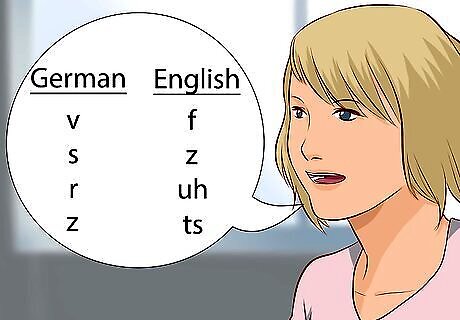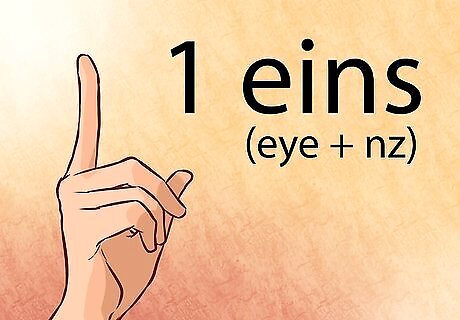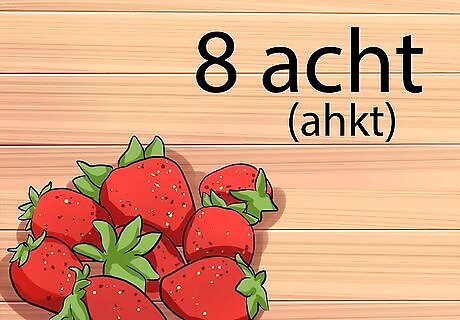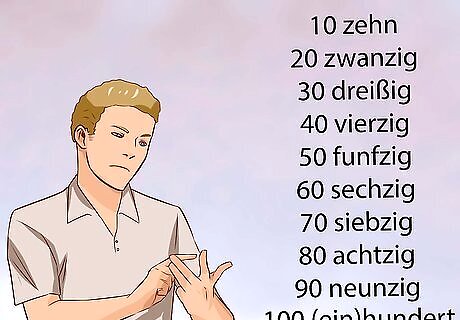
views
Understanding How to Pronounce German

Hold your mouth tightly when you speak. It doesn't do any good to learn words in German if you're not saying them right. Remember that Germans have a lot of tension in their cheeks when they speak. To sound like a German, you need to hold your mouth right. When you open your mouth, shape it as if you are forming a large "o" or a lowercase "u." Try to find videos of people speaking German so you can understand how they keep their mouth when speaking. Germans also pronounce some consonants and vowels differently than English speakers would.

Learn how to pronounce German vowels. Although German does share some things in common with English, some of the vowels are pronounced differently. This will be very important when you try to count in German. In German, the vowel combination of "ei" is pronounced like the "i" in "lie" or the "y" in "dry." For example, the word "drei" in German means three. However, it's pronounced "dry." Similarly, the word "frei" means free in German. It's pronounced "fry." It's the opposite for the vowel combination "ie." This combination is pronounced like the "ee" in the English word "free." So when you say the German word for four ("vier") remember to pronounce the "ie" in it as "ee." The vowel combination of "eu" is pronounced "oy" in German. If you see an umlaut over a vowel, you pronounce that vowel differently. The German word for "five" has an umlaut: fünf. The ü should sound like "oo" but with rounded lips.

Understand how to pronounce German consonants. One of the key ways that speaking German differs from English is how you pronounce some consonants. Some will be pronounced similarly to English, but not all. The consonant "v" is pronounced as an "f" sound. So make an "f" sound, not a "v" sound, when you pronounce the German word for four. In German, the consonant "s" is pronounced as a "z" when it starts a word, such as "sieben" (the German word for seven). When the letter "r" ends a word, it's pronounced lightly, as in "uh." The letter "r" is also pronounced very lightly when it's in the middle of a word. Put your tongue on the roof of your mouth as you say it. So, the word in German for four "vier" is pronounced "feeah." When the consonant "z" starts a word, pronounce it as "ts."
Counting in German

Start counting from 1 to 10 in German by saying the word "eins" for one. To pronounce "eins," say the word "eye" but pronounce the ending "nz." It's pretty easy to count to 10 in German now that you know how to pronounce some of the key consonants and vowels.

Say "zwei" for the number two. In German, "zwei" is pronounced as "tsvy." The "zw" is not pronounced as an English "z" would be, but rather is said as a "ts" sound.

Say "drei" for the number three. Pronounce it as "dry," with the "r" pronounced guttural.

Use the word "vier" for the number four. This word also has different consonant sounds than English. Pronounce "vier" like the English word "fear," but remember not to end with a hard "r." Say it more like "feeah."

Say "fünf" for the number five. Say it like "foonf," and put a big accent on the "u" and make it an elongated sound.

Use the word "sechs" for six in German. In this case, you do use a "z" sound. Pronounce it "zecks."

Say the word for seven as "sieben." Pronounce it as "zeebhen." The "s" sound when it starts a sentence sounds like an English "z."

Use the word "acht" for the word eight. Pronounce this German word as "ahkt."

Say "neun" for nine. Pronounce it "noyn."

Complete your counting with the word for ten, which is "zehn." Don't forget the German rule that the "z" starting a sentence is pronounced with a "ts" sound; thus, pronounce "zehn" as "tsehn." You might also need to know how to say the word for zero in German once you've mastered how to count 1 through 10. Zero is "null," but that's pronounced as "nool."

Understand how to count past 10 in German. Once you've mastered basic German pronunciation and how to count past 10, try counting higher! It's easy. Put the word "zehn" after each number to indicate you've added 10 when counting from 13-19. So, "neunzehn" is how you say 19 and "achtzehn" is how you say 18, and so on. Eleven is pronounced "elf" and 12 is "zwölf." Twenty is "zwanzig." To count past 20, start with the German word for the second number and add the word for the number 1-10 and "und" and then "zwanzig." So, 21 is "einundzwanzig," which literally means "1 and 20" (while dropping the "s" in "eins.") To say 22, follow the same process. The word for 22 is "zweiundzwanzig." And so on through 29. Follow the same process all the way up to 100. However, instead of zwanzig, put the words for 30 ("dreißig" - the ß is "ss" in German and pronounced the same as the "s" in English), 40 ("vierzig" - pronounced "feahtsig'), 50 ("funfzig"), 60 ("sechzig"), 70 ("siebzig"), 80 ("achtzig"), and 90 ("neunzig"). The German word for 100 is "(ein)hundert" (pronounce the "d" like a "t" and the "u" like "oo.")
Ways to Learn German

Find a native speaker. One beauty of the Internet is that it's easier than ever before to find native speakers of foreign languages to practice with. The same is true of German. Various language sites online will match you with native speakers. Some allow you to hear pronunciation by putting your cursor on a letter. Look up You Tube videos of people speaking German, including counting from 1 to 10, so that you can hear the words before you try speaking them.Some sites use music and song to teach children and others how to count in German.

Take a language course online or at a university. German is a very common language at universities. It should be pretty easy to find a local school that teaches the language if you live in a big enough city. Otherwise, you could check online. You could also record yourself counting to 10 in German, and then play it back. This is one of the best ways to perfect your speech. Traveling to or living in Germany is going to greatly enhance your language abilities. Speaking a foreign language repeatedly to native speakers is really the best way to learn it.


















Comments
0 comment